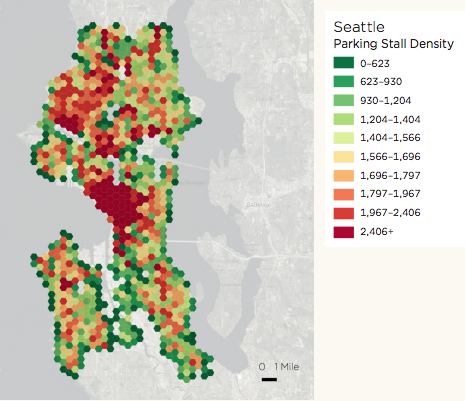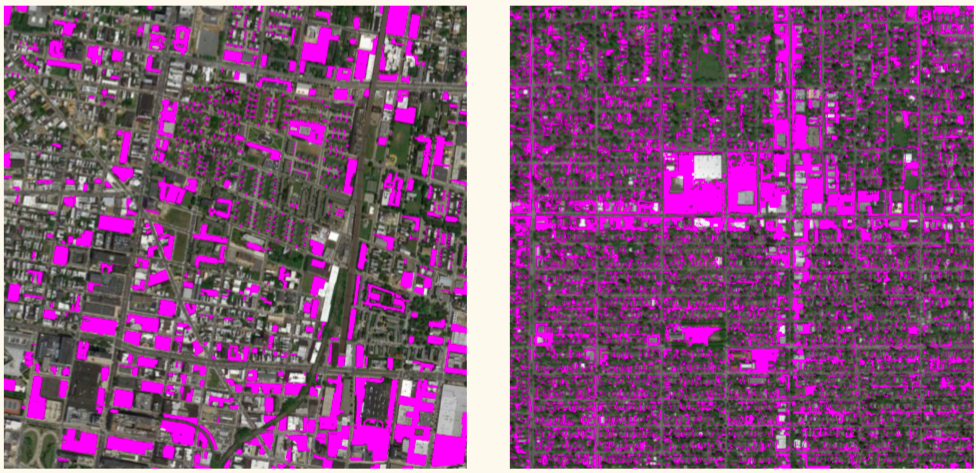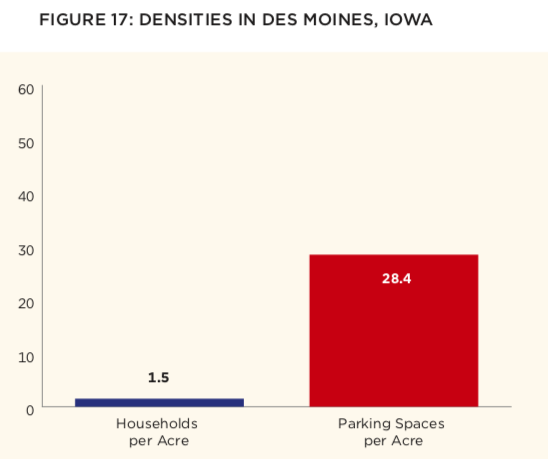Parking spaces are everywhere, but for some reason the perception persists that there's "not enough parking." And so cities require parking in new buildings and lavishly subsidize parking garages, without ever measuring how much parking exists or how much it's used.
Now new research presents credible estimates of the total parking supply in several American cities for the first time. The report from Eric Scharnhorst at the Research Institute for Housing America, an arm of the Mortgage Bankers Association, provides city-level evidence of the nation's massively overbuilt parking supply and the staggering cost to the public [PDF]. The conclusions bolster the parking research pioneered by UCLA professor Donald Shoup.
Scharnhorst used satellite imagery and tax records to tally on-street parking, surface parking, and garage parking in five cities: New York, Seattle, Philadelphia, Des Moines, and Jackson, Wyoming. The method can be replicated to measure parking in other cities, he says.
It's not an exaggeration to say American cities have been built for cars more than people. "After decades of requiring parking for new construction," Scharnhorst writes, "car storage has become the primary land use in many city areas."
In Des Moines, for example, there are 18 times as many parking spaces per acre as households -- 1.6 million parking spaces and about 81,000 homes. In Philadelphia, there are 3.7 times more parking spaces than households. Of the five cities, only New York has more households than parking spaces, and New York still has 1.85 million parking spaces.
Much of the parking in the central districts of these cities -- the places with the best access to jobs -- consists of garages, the most expensive type of parking to build. In Seattle, one-third of the city's parking supply is located in downtown garages.
Despite occupying such valuable land, many spaces in these garages sit empty. Scharnhorst reviewed prior research to gather data on parking occupancy in the five cities. In Seattle, the parking occupancy rate downtown is 64 percent.

So much for the belief that there isn't enough parking.
In Des Moines at mid-day, one publicly-funded parking garage is just 8 percent full. Outside downtown Seattle, occupancy rates are as low as 43 percent. Only in New York City are some parking facilities close to fully utilized, and even there it's only the cheaper ones.
All this parking spreads destinations farther apart, making walking, biking, and transit less viable and further entrenching car dependence.
Parking is also extremely expensive to construct and maintain. If you built all the parking in these five cities today, Scharnhorst estimates it would cost $81 billion.
It's a damning picture of America's huge misallocation of resources to car storage.
The lending industry has been a big part of the problem, insisting on outdated parking formulas as a condition for financing new construction. The fact that this report was commissioned by mortgage bankers indicates that the industry may be ready to change its standards.
Parking inventories like the one Scharnhorst compiled for his report can lead to better decisions about parking construction, replacing the current system where parking is mandated by zoning codes based on guesswork and pseudoscience, and where the assumption is that everyone must be able to drive and park at every potential destination on the busiest day of the year.
Scharnhorst concludes that cities should change course, and that in places with excessive parking developers should "allocate capital to non-parking uses" -- a.k.a. housing, commercial buildings, and, in general, the sorts of things that make cities habitable for people instead of cars.







